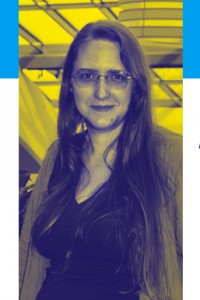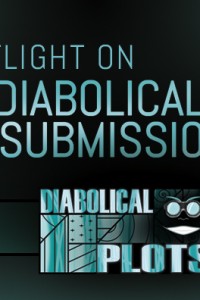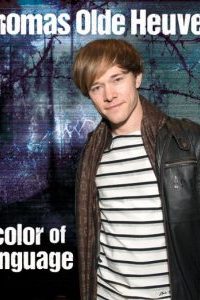Ann Leckie: Silhouettes

Ann Leckie was born March 2, 1966 in Toledo OH and grew up in St. Louis MO. She attended Washington University, graduating with a degree in music. She has ‘‘worked as a waitress, a receptionist, a rodman on a land-surveying crew, and a recording engineer.’’
Leckie attended Clarion West in 2005, where she wrote first published SF story ‘‘Hesperia and Glory’’ (2006). Over a dozen stories have appeared since, including two in collaboration with Rachel Swirsky.
Her debut novel Ancillary Justice is one of the most honored books in the field: it is a current Hugo Award finalist, won the Nebula Award, Clarke, BSFA, and Golden Tentacle awards, and was nominated for Tiptree, Campbell Memorial, Dick, and Compton Crook awards. The novel begins the Imperial Radch series, with Ancillary Sword forthcoming this fall and Ancillary Mercy planned to conclude the trilogy.
Leckie founded online magazine GigaNotoSaurus in 2010 and edited it until stepping down in 2014. She was an assistant editor at podcast magazine Podcastle until earlier this year, and served as vice president of SFWA from 2012-13. She lives in St. Louis with her husband and two children.
‘‘My parents were not interested in science fiction. They always thought I would grow out of it, and I didn’t. So they were like, ‘We’ll make sure she reads some good stuff,’ so they’d give me random books for Christmas, birthdays, or whatever. (Like Stanislaw Lem – that was when I first read him.) They were biochemists who worked at the Washington University Medical School, in different labs. They were big mystery readers, and they felt like science fiction wasn’t about human relationships, it was just about rocket ships and laser guns, and maybe some technical stuff. It’s Sturgeon’s Law: ‘99% of everything is crap.’ (You could say the same thing about mysteries, although I never actually said that to them.) My mom always felt I was going to be a writer someday, so when it became clear I was going to write SF, she told me, ‘OK, I totally support you.’ That was really nice. Everybody should have such parents!”
…
 ‘‘I joined two Internet critique groups, Critters and the Online Writing Workshop. I did my first NaNoWriMo — National Novel Writing Month– in 2002, then again in 2003, and I took the novel to Critters. It’s free, anybody can join, and every week a packet of stories comes out and you have to critique a certain number to get points, and when you have enough points you can put your own story in for critique. It’s mostly short fiction, but they have a way to do novels – it’s called a ‘request for dedicated readers,’ and people sign on to just read your novel and it counts for X number of short story critique credits.
‘‘I joined two Internet critique groups, Critters and the Online Writing Workshop. I did my first NaNoWriMo — National Novel Writing Month– in 2002, then again in 2003, and I took the novel to Critters. It’s free, anybody can join, and every week a packet of stories comes out and you have to critique a certain number to get points, and when you have enough points you can put your own story in for critique. It’s mostly short fiction, but they have a way to do novels – it’s called a ‘request for dedicated readers,’ and people sign on to just read your novel and it counts for X number of short story critique credits.
‘‘Some readers told me to go to Clarion, and I thought, ‘I wonder if I can swing it.’ I submitted the second and third short SF stories I ever wrote to both Clarions, got into both, and decided to go to Clarion West. Octavia E. Butler was there (that was the year before she died). Andy Duncan, L. Timmel Duchamp, Gordon Van Gelder, Connie Willis, and Michael Swanwick also taught us. There were a great bunch of people in my class, and I had a really wonderful experience. Before, I was like, ‘I think I’m going to try to write.’ I came home, and I was a writer!”
…
‘‘At first, I was just playing with the universe for fun. I said, ‘Wouldn’t it be cool if there were a society that genuinely didn’t care about gender?’ During Clarion West, I wrote a story set in that universe, and I used ‘he’ for everybody. I was totally unhappy with that. Why is male the default? Let’s make female the default! Of course, there are problems with that – serious problems. Using ‘she’ for everybody doesn’t genuinely give the impression of a society where gender doesn’t matter. (But it worked.)
‘‘The way you can’t deal with somebody without putting them into that gender pigeonhole is so strong! When you take a baby to the supermarket, everybody wants to lean over and coo at your baby, because babies are adorable. But sometimes, people lean over to coo at the baby and they stop, because they don’t know how to coo if they don’t know what gender the baby is. That blew my mind, when I had babies. They’d assume that my daughter was a boy, or my son was a girl, and I wouldn’t say anything, but at some point the truth would come out, and they’d go ‘Oh, I’m so sorry!’, like they ran over my dog or something. The baby doesn’t care, and how can you tell? There’s no reason to gender a baby.
‘‘My concept of non-binary genders was very rudimentary, but that’s where I started. I learned a lot about gender as I was working on the book. ‘It’ has that not-a-person feel to it. Gender-neutral pronouns feel awkward and blunt, because we’re not used to them, so I think it’s important to do that. At the same time, you don’t get that kind of visceral impact currently. Some people have asked, ‘These other characters – what gender are they?’ I’d say, ‘Well, first of all, it doesn’t matter. But second, in my very first iteration of the book I was using he or she for everybody, but by the time I was done with the first draft, the genders had just kind of slipped around.’ Originally I wrote the novel just using ‘he’ and ‘she,’ but was not getting the effect I wanted. (It creates too many expectations. In a plot where your main character is a woman and a guy shows up – ‘Oh, here we go. That’s the romantic interest.’) In the final version of Ancillary Justice, the first chapter is completely unreliable about gender.
“I’ve seen some folks complain that they can’t visualize any of the characters. Part of that is because I don’t generally do heavy-duty physical description anyway. You start out with an ‘I,’ and it’s almost like Schrödinger’s cat. When I read a first-person story and the gender isn’t marked really soon, I settle on one or the other, because I live in this culture and I speak this language. But I think I prefer a blank silhouette to an overly described one.”
…
‘‘I don’t know what’s coming up after the trilogy. I’ll figure something out. I have an entire fantasy universe where most of my short fiction is set (because I couldn’t sell the short science fiction I wrote). I love world-building – love it a lot. I don’t mind reading quick, sketchy world-building, but I need that really heavy foundation to build the characters and hook everything together. Theoretically, I could do a novel in that fantasy world if I needed to.”






Ancillary Justice is one of the best books I’ve read in several years, and I’m looking forward to the sequels even though I normally would prefer more stand-alone novels. The gender ambiguity was very refreshing, as was the unique narrative technique of a multi-conscious personality. In my own review I stated that I can’t tell you the gender of any of the characters with confidence, and I agree with Ms. Leckie that it doesn’t matter.